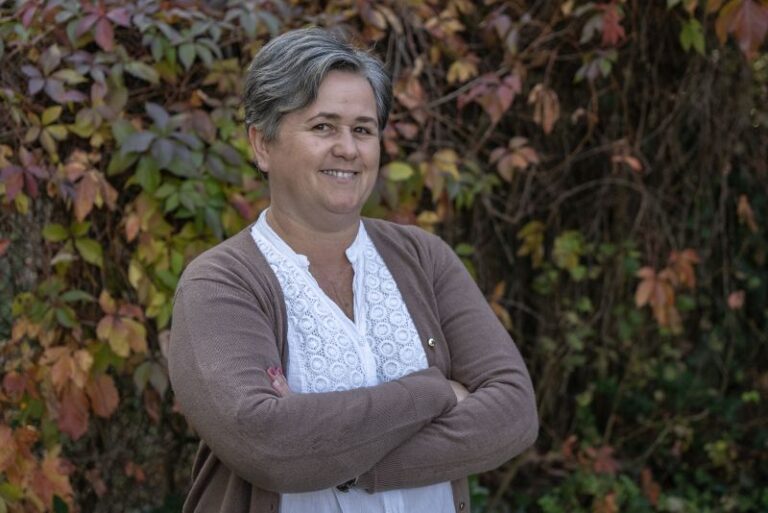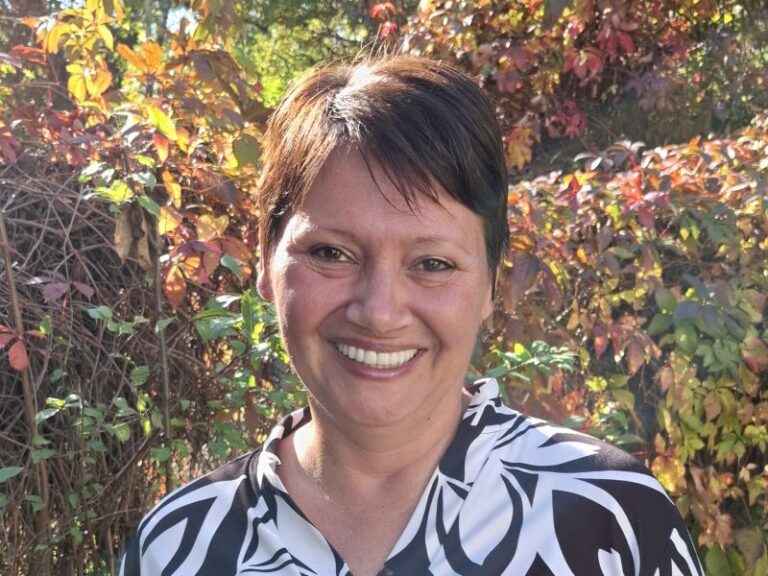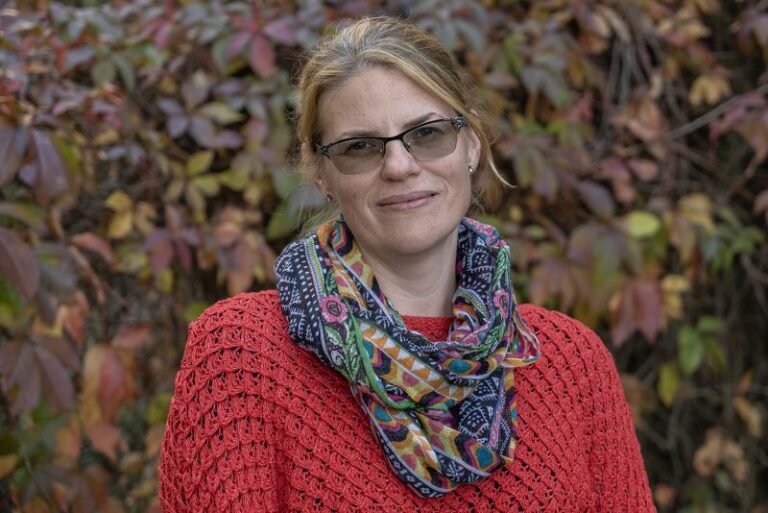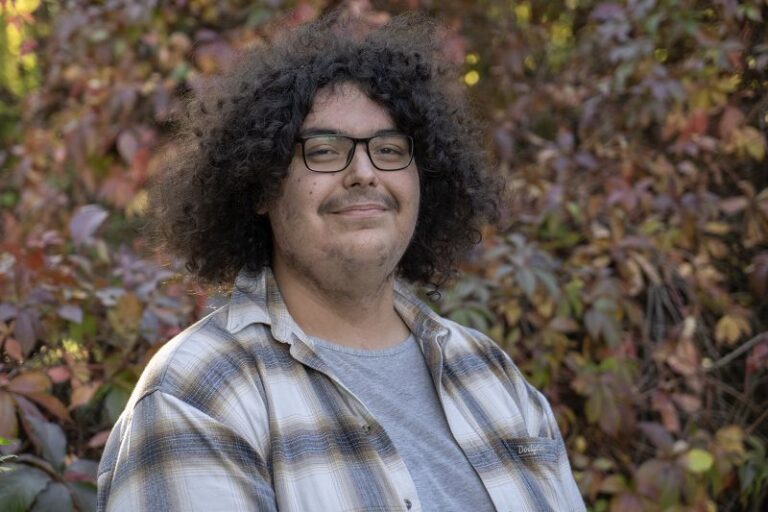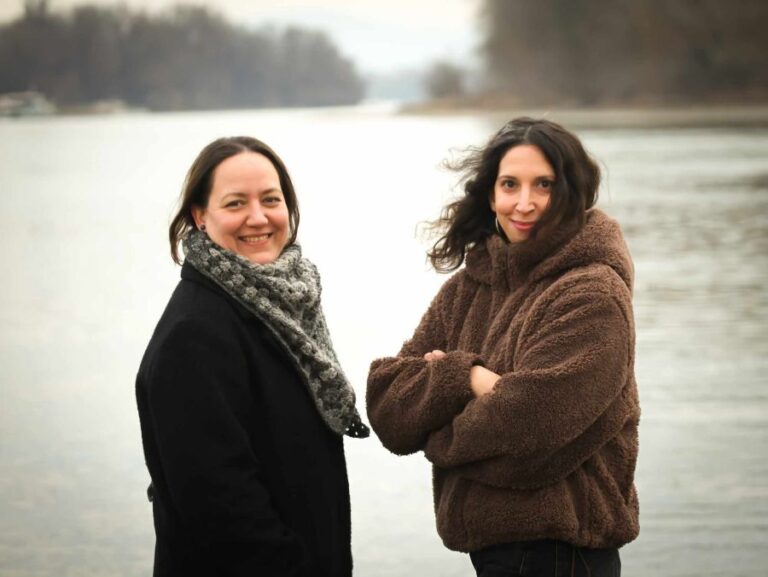“There are many people in Hungary who want to do something.”
Zebra guards at the school, a film club with first-time film directors, community discussions on topics such as journalism and astronomy, the lure of exhibitions, building bridges between indigenous and non-indigenous people – an arbitrary selection of the activities of the Diósdak Diósdért Egyesület (DiDi). We spoke to Orsi Kiss-Bakucz, a supporter of our Revitalising Small Towns Programme (RST), about how she has moved Diósd, which had been a dormant town, to a new life.
As a beneficiary of our programme, what have been the most important events in your civic life over the last 3 years?
I became the leader of a functioning organisation.
What has this organisation done in the last 3 years?
We have organised communities based on our own ideas: we run a club, a film club, a walker, we invite people to exhibitions, we have a bin adoption service, we are zebra guards and we organise a lot of other community events.
Could you give me some details?
Sure. Our community club has been running for a year now, after we received a grant to use the space called PrésBar22 for weekday use, which is a party venue on weekends. At first we thought we would organise a club for teenagers, but we quickly realised that they didn’t come to the aunties and uncles. Then we started to work on topics that we were interested in, organising thematic discussions with invited guests. We’ve had journalists, astronomers, local self-determination, and we also have a travel edition and a creative teahouse.
The infrastructure for the film club was funded through the Community Developers Association‘s fundraising event, Live Crowdfunding Night – our plan was to hold our screenings indoors in the garden. One of our donors told us that he had the screening rights to the film We Started Together and offered to bring it along, and to make it a proper screening, he would also give us the Moving Cinema. Then I got carried away and asked the director to come along. Yvonne Kerékgyártó came, we talked, and later we decided that we should continue, and we got the Moz Moz Moz for nine more times, so we projected with a huge cinema projector in our little basement. I chose a first-time directors theme, we saw films that explored social issues – we watched Separate Pack, Larry, Holiday in the West, FOMO, Six Weeks, Zanox, God Shift, 9 Months of War and Eviction. We always have the director whose exam film we’re screening, so our cinema is a combination of short film, feature film and then a talk with the director. The series has continued this year, for example with a film featuring Enikő Börcsök’s first theatre production, The Father of Ferike Herner. This film is only shown in club cinemas, and we were approached by director Attila Gábor Kovács. It was the first cinema we had screened with our own technique.

How many people are at a screening?
The minimum was 25, last time we had 68.
Dió Döme’s walker has been around for three years. What has happened since then?
Folk tales have been flying around in 3-6 languages ever since. My husband, Bence, regularly lectures about it to computer scientists at the university, and we also talk to various groups of librarians about the walkers, and we look for communities like our own. In 2022, the first Wise Clement’s Walker was born in Bölcske thanks to the local librarian, then we moved on, for example, all six children in Závod received this for Christmas 22 from the village because there was no money for traditional Christmas gift packages. There are now 13 walkers across the country, the latest being Puttonyka’s walker in Eger.
We have the IT background for all the events and we have written a blog with everything you need to know from the start, so we have the know-how.

How are your traditional micro-community programmes?
This is the third school year that we have had a person stand at two crosswalks for 40 minutes in the morning, in snow, frost and sunshine, wearing a crossing guard vest and carrying a disc, helping children cross to school. In the last three years we’ve had over 40 zebra crossing guards, I just have to check the spreadsheet sometimes to make sure everything is OK and they know I can jump in if there’s an emergency – so since September I’ve had three in total. It’s a task that a lot of people take on, so it’s become a self-running project.
With the advent windows this year, I pulled a bigger one than was healthy. The year before last, every house I visited had a decorated and illuminated window with a walnut tree and an Advent story. This year, I found myself saying that we were organising a community-building, neighbourhood event, so every day of the Advent season, light hunters, or in other words, visitors, were welcomed with an hour of tea outside the illuminated window. It seemed like a good idea, it was, but it quickly became apparent that it suited me as an organiser to attend the events, so I turned up for 22 of the 23 evenings and was very tired by Christmas. But it was worth it, there were some very good live connections.

Anything else?
I have an old crush on an issue that is important to me, the issue of ending violence against women. We have organised a film screening on the subject, I have brought from Budaörs the exhibition “All is not well!” by Emese Májer-Marcinka, and I have organised a discussion with representatives of institutions and NGOs working on the issue.
Well, and the Common Eater – our community club is also important.
Another big thing was to bring the Petőfi bus here. Last year we had the Petőfi 200 series of events, and we have a museum bus that goes from settlement to settlement. The House of Culture in Diósdon didn’t ask for it to come here, so we asked for it. It wasn’t easy, we needed an area where we could park the bus, and the Radio and Television Museum on the Antenna Hungária site allowed us to do that, and even provided electricity. It was the only Sunday in May when it rained from 8am to 7pm, but 150 people still came.
You said three years ago that you wanted to bring natives from Diósd and newcomers closer together.
It worked. I think so.
What are the signs of that?
For example, last year DiDi presented two awards. One was the association’s Thank You Award (Community Welcome Award) and the other was an extraordinary award. The mayor of Diósd was made honorary mayor for 33 years of service. However, the other candidate for the honorary title was Uncle Feri Herman, who is over 90 years old, was the first mayor after the regime change, and is an amazing community builder, respected by everyone, but he received nothing for his role before the regime change – he was the council president of the town. So we decided, with the Diósd History Group, that we would recognise his work on behalf of the community, we had an award made for him and we presented it. It is also a sign that the old people have accepted us. At the same time, of course, they must also accept that there are now 12,000 people living in Diósdo, up from 3,000 before.
What do the people of Diósd think of the buzz you have created?
Some love it, some are irritated by it. The municipality still doesn’t like me.
I guess you get feedback from the people.
We launched our newsletter two weeks ago, 120 people signed up on the first day. They seem to be interested in what we do.
Do they approach you on the street?
Yes. For example, children don’t like to walk with me unless they know there are no people on the street.
What do the local authorities think of you?
The local authorities still expect us to run in the elections. For example, on April 1st last year – when we traditionally goof off and have a pub quiz – we got together about 50 of us and I was approached by someone who said: we are campaigning very well and how well we are building up to the elections more than a year away. Then I said into the microphone that we were not standing in the elections, we were not backed by the powers that be, we were not backing them, we were just having a good time.
Are you under suspicion?
Yes. I received a phone call a few days ago, informing me how many seats we had a chance of winning. We were approached from several sides, we told them we were not running with anyone. There are some interesting things happening, the use of the DiDi logo colours, the organisation of similar programmes and events to what we have been doing…
They are trying to gauge us because our activities always make waves. What DiDi stands for is beginning to carry weight, and in three years we have become a force for change.
How do you personally experience all this?
The association was founded because of the support of the Revitalising Small Towns programme, and it took me a long time to accept that I am the face of this organisation. I had to accept that I had a responsibility not only to the four or five people who were part of the narrow core, but also to the other fifty people who supported us and were involved in our work. The breakthrough in this respect came when I shared a short film about myself; then something clicked in me and I realised that I was the external personification of the association. Since then, I’ve been consciously trying to make everything look like what I feel it is. As a result of this now conscious building, I am also starting to create an organisation out of a group of friends, which seems to be working.
Is that good?
Yes. For a long time I went about my daily life on my own, that changed when I started writing the later winning application for the Common Values Programme. I realised that it was on a different scale to anything I had done before, that I was not enough to do it on my own, and I also had to recognise that there were a variety of people on our team, dreamers, strategists, doers, who needed to be brought together and build relationships outside the community. To do all this, you need an organisation.

At the beginning of the interview you said that you were most proud of becoming an organisation; why didn’t you mention a specific one?
I’m proud of the process, and of building an organization that has an impact and is a good place to belong. From the outside we are told that DiDi is a diverse, strong, safe, values-driven association.
What has the money and professional support of the Roots and Wings Foundation (FRF) brought to all this?
Without the RWF, I wouldn’t start learning and I wouldn’t be convinced that what we were doing instinctively was right.
Are you more confident now that you have learned?
No, I have much more doubt. But it’s that whole ‘coming home’ feeling: I feel like I’ve arrived, it’s what I’m meant to do.
The importance of the financial support is clear: it has given us financial security, giving us the opportunity to do what is important to us. Before that, we were trying to do it from almost nothing.
When the funding cycle ends, will you be able to replace this funding?
We’ve won some small and large grants, we plan to reach out to potential local donors, and in the meantime we’ve become eligible for the 1 percent pledge. What we have built up seems sustainable.
What has the Foundation’s professional support meant beyond learning?
The Foundation staff – my mentors – have been very helpful in solving my questions and dilemmas. They never told me what to do, they never told me if what I was doing was right or wrong, but they guided me, helped me with questions, like an adolescent searching for himself. They gave me security in case of faltering.
Who would you recommend to run in the next RST application?
Those who are determined. There are many people in Hungary who want to do something and think they are alone. This call is good because it confirms that you are not alone – it is a real programme, not just a project. Today I know that I am not the only one with a unicorn.
(Iván Bardócz)
